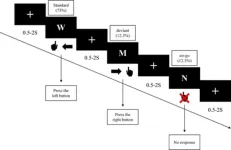(Press-News.org) UNIVERSITY PARK, Pa. — This summer, viral misinformation claimed that the Amish did not vaccinate against COVID-19 and, as a result, had a death rate 90 times lower than the rest of the United States. Now, a Penn State study is the first to provide geographically broad and population-wide evidence that while the Amish-populated counties across the nation tend to have lower vaccination rates than other populations, they are not entirely unvaccinated.
The research was published recently in the journal Population Research and Policy Review.
The Amish are a distinctive Christian subculture that traces its roots to the 16th century Protestant Reformation. According to Cory Anderson, author on the study and postdoctoral fellow in Penn State’s Population Research Institute, part of the Social Science Research Institute, medical documents typically don’t include patients’ religious beliefs, making it difficult to study the Amish and other religious groups from medical records.
Additionally, the researchers said, a low number of COVID-19 tests were taken in the Amish community during the pandemic, so assessing data on COVID-19 cases or deaths among this population is difficult.
“While there is relatively little quantitative data analysis on Amish vaccination, some local studies have suggested that Amish were vaccine hesitant before COVID-19,” Anderson said. “With new population data on COVID-19 now available, we wanted to determine vaccination rates in counties with high Amish populations.”
The researchers conducted an analysis of county-level data in Amish-prevalent counties. As the counties only showed the vaccination rates of the entire population, analyzing Amish-prevalent counties gave the researchers an estimation of Amish vaccination rates.
“We examined over 350 counties spanning 10 Amish-populated states from February 2021 — when the vaccines became available — through October 2022 to determine COVID-19 vaccination rates and other social demographic data from a variety of sources including the Centers for Disease Control and Prevention, U.S. Religion Census, U.S. Census, American Community Survey, and the Massachusetts Institute of Technology Election Lab,” said Shuai Zhou, postdoctoral associate in the Department of Global Development at Cornell University and former graduate student under co-author Guangqing Chi, professor of rural sociology and demography at Penn State.
They found that Amish populated counties had an approximately 1.6% lower COVID-19 vaccination rate than counties without significant Amish populations. Given that only three counties had an Amish population of more than 20%, this rate is notable, the researchers said. The results suggest that higher percentages of Amish in a county significantly decrease the county-level vaccination rate while controlling for other covariates expected to also predict lower vaccination rates, such as political ideology, rural/non-rural status, household income and evangelical Protestant affiliation.
Specifically, on average, while holding all other variables constant in the model, the researchers found that 10% more Amish population corresponded to 16% less in the monthly county-level COVID-19 vaccination rate. All though not explicitly noted in the paper, the researchers’ calculations suggested that in October 2022, Amish-populated counties exhibited an average daily vaccination rate of .06%, compared to the national average rate of .08%.
“The results support our hypothesis that Amish affiliation independently predicts vaccine hesitancy,” Anderson said. “This finding supports our hypothesis that Amish are under-vaccinated for COVID-19, although not at the rate some recent commentators have suggested.”
Anderson, who is part of the Amish community, said he saw at the beginning of the pandemic the Amish were side-stepping many preventative measures and hypothesized COVID-19 vaccination rates would be lower than the rest of the population. However, widely circulated commentary that no Amish were vaccinated were unsubstantiated.
The findings underscore the failure of public health outreach efforts to convince the Amish to accept COVID-19 preventative measures and vaccines, according to Chi.
“Health service providers working with the Amish need to realize that it takes time to build a collaborative and trustful relationship with them, and humility goes a long way,” Chi said.
According to Anderson, the Amish community is unrepresented in higher education, therefore scientific knowledge about these communities is coming out of institutions they are not a part of.
“This has repercussions on their response when scientific knowledge is translated into public health policy,” Anderson said. “Academia should continue to invest in resources to collaborate with this population.”
Learning more about this community is important, Anderson said, because the Amish population is growing, and as it grows, the Amish will migrate to new places throughout North America.
“Their impact will be felt on rural communities, where population density is low and public resources are slim,” Anderson said.
With this study complete, Anderson and his team will continue to analyze data to discover deeper cultural changes during the pandemic.
“Challenging times have a way of bringing to the forefront cultural patterns that are buried deeply when life is routine,” Anderson said. “Challenging times reveal what a community is made of and can shape the culture moving forward.”
Support for this work was provided by the Population Research Institute, which is supported by an infrastructure grant from the Eunice Kennedy Shriver National Institute of Child Health and Human Development and Social Environments and Population Health training grant, and U.S. Department of Agriculture National Institute of Food and Agriculture Multistate Research Project. Further support was provided by a seed grant from the National Institute on Aging-supported Interdisciplinary Network on Rural Population Health and Aging.
END
Amish found to be under-vaccinated for COVID-19 but not unvaccinated
2023-09-06
ELSE PRESS RELEASES FROM THIS DATE:
Groundbreaking study reveals new insights into behavioral inhibitory control through functional neuroimaging
2023-09-06
A recent article published in Volume 3 of the journal Psychoradiology, researchers from Sichuan Normal University introduced an innovative Three-Choice BIC paradigm that merges the GNG and two-choice oddball (TCO) tasks. This study engaged 48 college students who responded to varied stimuli using designated keys and restrained responses to no-go stimuli. Employing functional neuroimaging coupled with conjunction and ROI analyses, the researchers sought to unveil unique neural pathways linked to BIC ...
Stress test abnormalities reveal more than just cardiovascular risks, Mayo Clinic study finds
2023-09-06
ROCHESTER, Minn. — The treadmill exercise test with electrocardiogram (ECG), also known as an exercise stress test, is one of the most familiar tests in medicine. While exercise testing typically is focused on diagnosing coronary artery disease, a recent study from Mayo Clinic finds that exercise test abnormalities, such as low functional aerobic capacity, predicted non-cardiovascular causes of death such as cancer in addition to cardiovascular-related deaths. These new findings are published in Mayo Clinic Proceedings.
The exercise stress test is noninvasive, easily available and provides important diagnostic information. In addition to the ECG itself, ...
Canine health data to guide new cancer study
2023-09-06
DENVER/Sept. 6, 2023 — A newly funded study will evaluate both the frequency and major risk factors for cancer in golden retrievers, a breed commonly affected by the disease.
The study will use data from Morris Animal Foundation’s Golden Retriever Lifetime Study, which is one of the largest and most comprehensive canine health studies in the world. The study will also incorporate data from Veterinary Companion Animal Surveillance System (VetCompass), a not-for-profit research project based at the Royal Veterinary College ...
Insomnia drug helps prevent oxycodone relapse, Scripps Research study shows
2023-09-06
LA JOLLA, CA—A good night’s sleep has many proven health benefits, and a new Scripps Research study suggests one more: preventing opioid relapse.
In the new study, published online in Neuropharmacology on August 12, 2023, scientists gave an experimental insomnia treatment to rats experiencing oxycodone withdrawal. The researchers found that the animals were far less likely to seek out drugs again in the future—even after ending the treatment. These findings could eventually lead to therapies to help prevent opioid addiction or relapse in humans.
“These results are very encouraging,” says Rémi Martin-Fardon, PhD, associate professor of molecular medicine ...
Disease affects blackbirds more than previously thought
2023-09-06
The researchers studied birds given a simulated bacterial infection in order to stimulate their immune system. The birds were then compared with birds whose immune system was not stimulated – and their activity was measured for several weeks using miniature data loggers.
“We found that the birds whose immune system was stimulated had reduced activity for three weeks, which is much longer than we expected. We could also see that the "sick" blackbirds stopped their activities ...
The António Champalimaud Vision Award 2023 distinguishes St John of Jerusalem Eye Hospital for their fight against blindness in Palestine
2023-09-06
The 2023 edition of the António Champalimaud Vision Award recognizes the St John of Jerusalem Eye Hospital Group (SJEHG) for its work supporting hundreds of thousands of people living in the Gaza Strip, West Bank and East Jerusalem, helping in the fight against blindness while providing access to essential health services in a region marked by conflict and instability.
The SJEHG has been developing its activity at the centre of three major world religions. The ongoing conflict in the region has had a severe impact on health care access and delivery. Without the intervention of the SJEHG, the rate of blindness would be rampant, increasing ...
CityU’s novel AI system enhances the predictive accuracy of autonomous driving
2023-09-06
Precisive real-time prediction of the movement of nearby vehicles or the future trajectory of pedestrians is essential for safe autonomous driving. A research team led by City University of Hong Kong (CityU) recently developed a novel AI system that improves predictive accuracy amid dense traffic and increases computational efficiency by over 85%, offering great potential for enhancing the safety of autonomous vehicles.
Professor Wang Jianping, in the Department of Computer Science (CS) at CityU, who led the study, explained the critical importance ...
Study finds association between being breastfed as an infant and risk of colorectal cancer as an adult
2023-09-06
Study Title: Being Breastfed in Infancy and Risk of Colorectal Cancer and Precursor Lesions
Publication: Clinical Gastroenterology and Hepatology: https://www.cghjournal.org/article/S1542-3565(23)00673-0/fulltext
Dana-Farber Cancer Institute authors include Chen Yuan, ScD, first author; Kimmie Ng, MD, MPH, senior author
Summary: Rates of young-onset colorectal cancer have been on the rise since the early 1990s. This study, led by researchers at Dana-Farber Cancer Institute, investigated potential links between being breastfed as an infant and having colorectal cancer later in life. The team evaluated data collected by the Nurses’ Health Study ...
Study looking at how intermittent fasting and weight loss affect aging
2023-09-06
Studies have shown that intermittent fasting can help people lose weight and may be easier to follow than counting calories to lose weight, such as traditional calorie restriction. Exciting new research in animals suggests that intermittent fasting slows aging and helps animals live longer.
Researchers at the Pennington Biomedical Research Center and the University of Alabama at Birmingham are conducting a study to see if eating for 8 hours and fasting for 16 each day can slow the aging process in people and are looking for healthy adults aged 25-49 to participate.
In this study, called DiAL-Health, researchers will ...
New global climate restoration fund announces first grant cycle
2023-09-06
[Bethesda, Maryland, USA -- September 6] The new Climate Intervention Environmental Impact Fund (CIEIF, www.cieif.org) begins operations today, with the goal of helping kickstart new approaches to restoring Earth’s climate in the face of rapid deterioration. CIEF makes direct grants to investigators worldwide working to stop and reverse global warming. The grants are focused on predictive environmental impact assessments, impact modeling studies, and stakeholder engagement for proposed small-scale field tests of innovative climate intervention technologies. CIEIF also offers investigators expert advice on ...



